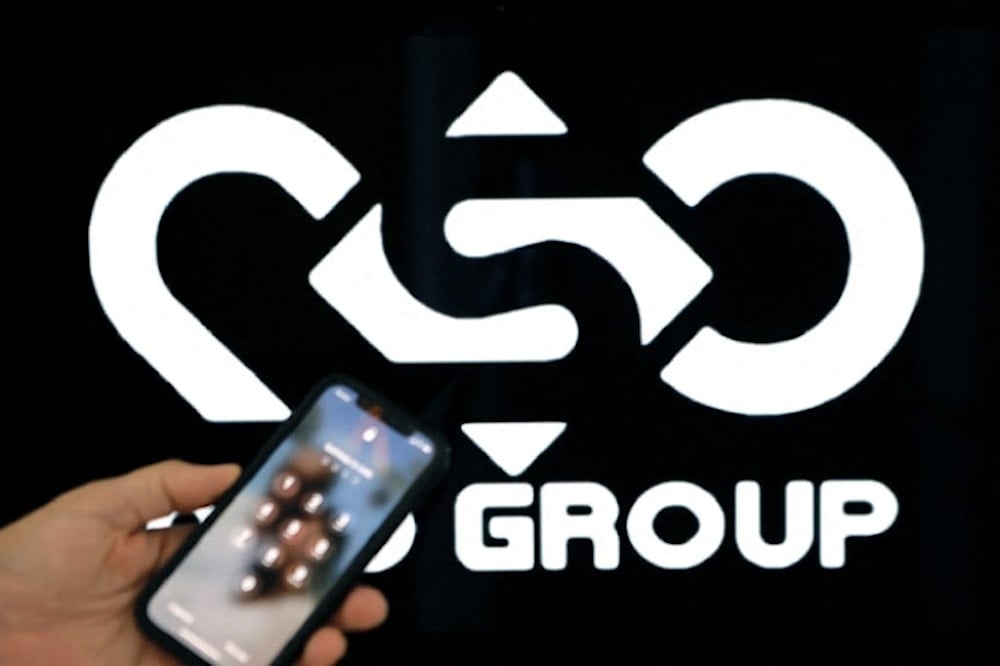Apple and WhatsApp push back as Israeli spyware enters US market
Apple and WhatsApp pledge to warn users about Israeli spyware threats as firms like NSO Group and Paragon Solutions expand ties with the Trump administration in the United States.
-

A photographic illustration shows a mobile phone near the NSO Group company logo in Occupied Palestine on February 9, 2022. (Jack Guez / AFP)
Apple and WhatsApp have pledged to continue warning users when governments deploy hacking tools against them, even in the United States, as two controversial Israeli spyware companies expand their reach under the Trump administration.
Paragon Solutions and NSO Group, both founded in "Israel" and now owned by US investors, are actively seeking access to US agencies. Paragon, the developer of Graphite spyware, secured a deal with US Immigration and Customs Enforcement (ICE) in September after the Department of Homeland Security lifted a freeze on a $2 million contract.
Both Apple and WhatsApp have taken a firm position against the spread of spyware across the globe, and have alerted individuals across multiple nations whenever their devices were compromised, including Italy, Spain, India, and others.
Apple confirmed in a statement to The Guardian, “Threat notifications are designed to inform and assist users who may have been individually targeted by mercenary spyware, and geographic location is not a factor in who they are sent to.”
WhatsApp echoed the sentiment in a separate statement to The Guardian, stating, “WhatsApp’s priority is to protect our users by disrupting hacking efforts by mercenary spyware, building new layers of protection and alerting people whose device has come under threat, no matter where they are in the world.”
Read more: US judge rules Israeli NSO Group liable for WhatsApp hacking
Apple and WhatsApp’s parent company, Meta, has had previously cooperative ties with the Trump administration, raising concerns about how these firms might respond if US-based users are increasingly targeted by spyware.
Trump-era officials linked to NSO Group resurgence
NSO Group has long been at the center of international controversy due to its Pegasus spyware, which enables complete surveillance of a target’s phone. In 2021, the Biden administration accused the company of acting against US national security interests and imposed sanctions.
Meanwhile, NSO Group, previously sanctioned by the Biden administration, announced that David Friedman, former US ambassador to "Israel" under Donald Trump, will serve as executive chairman of its new holding company. The company was recently taken over by a group of US investors, reportedly including Hollywood producer Robert Simonds.
Now, with a leadership reshuffle and new US investors, NSO appears to be repositioning itself. When asked whether the firm would seek to lift the sanctions, Friedman said, “I hope that will be accomplished, but we haven’t made that request yet,” adding he had not discussed the matter with Trump.
Civil society and journalists targeted in Italy with Graphite spyware
Paragon Solutions had previously signed a contract with ICE in 2024 under the Biden administration. That contract was paused pending a review of a 2023 executive order prohibiting spyware that poses risks to national security or has been misused by foreign actors; however, ICE was reported to have regained access to the technology following the Trump administration's approval for a contract with the company.
Initially free of scandal, Paragon came under scrutiny in January 2025 when WhatsApp revealed that 90 individuals, including journalists and civil society members, had been targeted using Graphite. Following the revelations, Paragon ended its contract with the Italian government, citing violations of its terms of service.
Reports show that the spyware was used to target journalists, human rights activists, business executives, and even political strategists across Italy. The Italian government has acknowledged some of the surveillance but has denied responsibility for the broader abuses.
“This is the Italian Watergate,” former Prime Minister Matteo Renzi stated in an interview. “If the Italian government continues to deny they have used this against [multiple Italian business executives] and journalists, then the question is, who did?”
Read more: US pressure pushes Israeli cyber field toward collapse: Israeli media
Growing concerns over ICE use of surveillance tech in the US
The potential use of spyware like Graphite by US immigration officials has raised alarm among civil liberties advocates. Senator Ron Wyden voiced concern about ICE's history of aggressive surveillance.
“ICE is already shredding due process and ruining lives in its rush to lock up kids and families who pose no threat to anyone,” Wyden said in a statement to The Guardian. “I’m extremely concerned about how ICE will use spyware, facial recognition, and other technology to further trample on the rights of Americans and anyone who Donald Trump labels as an enemy.”
Experts also warn that most US institutions remain ill-prepared for such cybersecurity threats. “Nobody is protected,” said John Scott-Railton, a senior researcher at Citizen Lab. “Not hospitals, not lawyers and judges, not politicians, and certainly not regular citizens. The last thing America needs right now is a silent spyware epidemic.”

 5 Min Read
5 Min Read










